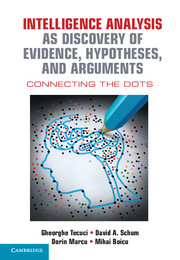 |
Intelligence Analysis as Discovery of Evidence, Hypotheses, and Arguments: |
This unique book on intelligence analysis covers several vital but often overlooked topics. It teaches the evidential and inferential issues involved in "connecting the dots" to draw defensible and persuasive conclusions from masses of evidence: from observations we make, or questions we ask, we generate alternative hypotheses as explanations or answers; we make use of our hypotheses to generate new lines of inquiry and discover new evidence; and we test the hypotheses with the discovered evidence. To facilitate understanding of these issues and enable the performance of complex analyses, the book introduces an intelligent analytical tool, called Disciple-CD. Readers will practice with Disciple-CD and learn how to formulate hypotheses; develop arguments that reduce complex hypotheses to simpler ones; collect evidence to evaluate the simplest hypotheses; and assess the relevance and the believability of evidence, which combine in complex ways to determine its inferential force and the probabilities of the hypotheses.
Reviews and Endorsements
"Intelligence Analysis as Discovery of Evidence, Hypotheses, and Arguments is a valuable resource for those interested in improving intelligence analysis. It provides both prospective and current intelligence analysts with an easy to read and understand explanation of a complex process, along with suggestions for how to more effectively implement that process. The examples from intelligence analysis and comparison to similar practices in other fields such as medicine, law, and law enforcement help the reader better understand how the interplay of evidence, hypotheses and arguments can develop in different contexts. In that sense, this book provides a wonderful platform for improving intelligence analysis by learning and employing best scientific reasoning practices."
Stephen Marrin, James Madison University, Virginia
"This is an important work in several ways. The authors both help readers learn the basics and give advanced training in the craft of analytical reasoning by providing sophisticated tools to guide understanding of its strengths, its probabilistic nature, and its limitations. "Deep" learning is what distinguishes experts from gifted amateurs; this book will help amateurs develop expert habits through guided learning and practice. I would not only recommend this book for students of intelligence, but also for students of law, journalism, and national security. The first several chapters should be mandatory reading for 'customers' and critics of intelligence, including policymakers, legislators, and professional journalists who are quick to ask "why didnít you connect the dots?" while they themselves probably have no idea how difficult that may be."
Mark T. Clark, Director, National Security Studies, California State University, San Bernardino, and President, Association for the Study of Middle East and Africa (ASMEA)